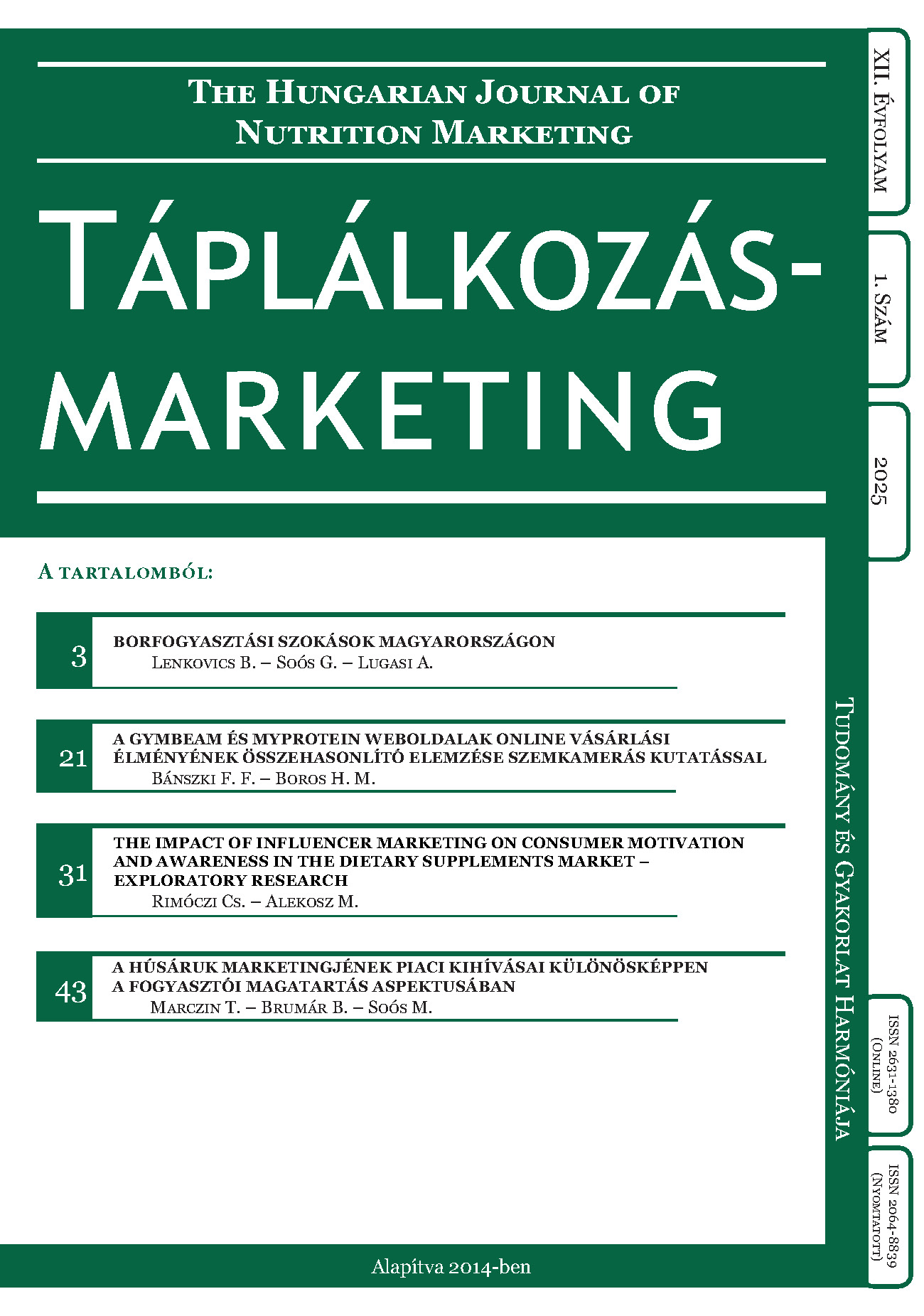Évf. 12 szám 1 (2025): Táplálkozásmarketing Aktuális szám
Teljes szám
issue.tableOfContents69892cb52a5bd
Cikkek
-
Borfogyasztási szokások Magyarországon
3-20Megtekintések száma:280A borkészítés és -fogyasztás országonként jelentősen eltér, ami a világ különböző bortermő régióinak sokszínűségéből és a fogyasztói preferenciák különbözőségéből adódik. A borágazat egy globális piac, ahol a borfogyasztási és -termelési trendek folyamatosan változnak. Az elmúlt évtizedekben a világ borpiaca teljes átalakuláson ment keresztül, és a magyar borkultúra is jelentős változásokon esett át. Minden korszak minden kultúrájának megvolt a maga elképzelése a borról, a borkészítésről és a borfogyasztásról. A borágazatnak a fogyasztói szokások változása is kihívást jelent. A kutatás célja a hazai fogyasztók borfogyasztási szokásainak megismerése. A vizsgálat feltérképezi a borválasztás szempontjait, a borfogyasztás és a borvásárlás helyszíneit. Magyarországon a borfogyasztás kis részét képezi a mindennapi fogyasztásnak. A kutatás eredményei azt mutatják, hogy a borfogyasztás hazánkban ma jövedelemfüggő. A jövedelmi helyzet javulása növeli a borfogyasztás gyakoriságát. További eredmények szerint a borvásárlás nagyobb mértékben történt magasabb jövedelmű és iskolázottabb emberek körében, ami hasonló a legtöbb ország fogyasztói közönségéhez. Az átalakulást új, tudományos eredményeken alapuló szőlészeti és borászati technológiák megjelenése, a minőségi borok iránti kereslet növekedése, a termelői tudatosság elterjedése és az igényes borfogyasztói réteg megjelenése generálta.
JEL-kódok: L83, M31PDF264 -
A Gymbeam és Myprotein weboldalak online vásárlási élményének összehasonlító elemzése szemkamerás kutatással
21-30Megtekintések száma:206Az egészségtudatos életmód iránti érdeklődés és a digitalizáció térnyerése fokozatosan növeli az online élelmiszer-vásárlás iránti keresletet. Ennek kapcsán kutatásunk célja annak feltárása volt, hogy a fogyasztók a vásárlási folyamat során milyen tényezőkkel találkoznak a GymBeam és MyProtein online áruházak vetületében. A kutatás során különböző módszereket alkalmaztunk. Szemkamerás kutatás mellett utókérdőívet és fókuszcsoportos beszélgetést is végeztünk. Elsőként szakirodalmi elemzést folytattunk, amely betekintést nyújtott az egészségtudatos fogyasztók online egészségesnek vélt termékek vásárlási szokásaiba. Ezt követően a szemkamerás vizsgálatban 38 résztvevő tekintette meg a GymBeam és MyProtein weboldalak főoldalát, az egészségesnek vélt termékkategória oldalakat, valamint két konkrét saját márkás termékoldalt. Az eredmények összegyűjtése után a résztvevők egy utókérdőívet töltöttek ki, amely segítette a demográfiai háttér megismerését. Végül a 8 fős fókuszcsoportos beszélgetés révén mélyebb információkat szereztünk a fogyasztói preferenciákról, benyomásokról és az online vásárlási magatartásról. A kutatás eredményei arra mutatnak rá, hogy a vállalatok számára különösen figyelembe kell venniük a vizuális megjelenést, mivel a csomagolás és az online promóciós stratégiák jelentős hatást gyakorolnak a fogyasztói döntésekre. Az eredmények alapján javasolt, hogy az online áruházak biztosítsák a termékinformációk érthető és tömör bemutatását, tervezzék meg az akciósáv elhelyezkedését, valamint gondolják át a felugró ablakok jelen módszerrel való alkalmazását a vásárlók hatékony megszólítása érdekében.
JEL-kódok: M31, I12PDF111 -
Az influencer marketing hatása a fogyasztói motivációra és tudatosságra az étrend-kiegészítők piacán - Feltáró kutatás
31-42Megtekintések száma:463A tanulmány az influencer marketing fogyasztói motivációra és tudatosságra gyakorolt hatását vizsgálja az étrend-kiegészítők piacán. A közösségi média rohamos térnyerése és a mindennapi életbe való beépülése az influencer marketinget a fiatalabb generációk – különösen az Y és a Z korosztály – elérésének egyik legdinamikusabb és legbefolyásosabb eszközévé tette. A kutatás célja feltárni, hogy az influencer marketing miként befolyásolja a vásárlási döntéseket, különös tekintettel az egészségtudatos életmód terjedésére. A szekunder és primer kutatások együttesen segítettek azonosítani az étrend-kiegészítők piacán a fogyasztói magatartást meghatározó legfontosabb trendeket és motivációkat. Ennek keretében hat kvalitatív, mélyinterjú készült Y és Z generációs résztvevőkkel. Az interjúk rávilágítottak az egészségtudatosság, a közösségi média hatása és az influencerek hitelességébe vetett bizalom kiemelt szerepére. A fogyasztók motivációi között az egészségmegőrzés, az energiaszint növelése és a kényelem domináltak, ugyanakkor az influencerek által ajánlott termékekkel szembeni szkepticizmus továbbra is érzékelhető. Az eredmények szerint az influencer marketing különösen erősen hat a Z generációs fogyasztókra, akiknél a hitelesség és a tudományos megalapozottság kulcsszerepet játszik. A Y generációs résztvevők ezzel szemben kritikusabbak voltak az influencerekkel szemben, és nagyobb mértékben támaszkodtak szakértői véleményekre. A tanulmány arra a következtetésre jut, hogy nélkülözhetetlen a felelősségteljes influencer marketing és a fogyasztók hiteles, átlátható tájékoztatása. Ez magában foglalja a félrevezető információk kockázatának mérséklését, valamint a tudományosan alátámasztott kommunikáció előtérbe helyezését. Az eredmények hozzájárulnak annak jobb megértéséhez, hogy a generációs különbségek miként alakítják az étrend-kiegészítők iránti fogyasztói elkötelezettséget, és hangsúlyozzák a szabályozott, etikus marketinggyakorlatok fontosságát.
JEL Codes: M31, I112PDF385 -
A húsáruk marketingjének piaci kihívásai különösképen a fogyasztói magatartás aspektusában
43-55Megtekintések száma:172Az elmúlt években az élelmiszeripar új kihívásokkal szembesül a fogyasztói igényekkel összefüggésben. A korábbi megszokott trendeket újabbak váltják fel, amelyek a húsféleségek fogyasztását és a feldolgozott termékek elfogadottságát befolyásolják. Magyarországi viszonylatban kiemelhető továbbá a kifejezetten árérzékeny fogyasztói magatartás. Ebben az új piaci környezetben a húsipari szereplőknek, ezen belül a töltelékes húsárukat fejlesztő vállalkozásoknak, olyan marketingtevékenységet kell folytatnia, amellyel, sikerrel tudják termékeiket értékesíteni. Az adott kutatás célja, hogy rávilágítson azokra a tényezőkre, amelyek meghatározóak ebben a folyamatban a fogyasztói preferenciák és az ágazat szereplőinek szemszögéből. A kutatás eredményei alapján elmondható, hogy a fogyasztók többsége heti vagy napi szinten fogyaszt hústerméket. Az étrend szempontjából egyenletesen oszlanak meg a friss és feldolgozott termékek, továbbá a vegyes fogyasztás. A húsféleségekre irányuló preferenciát vizsgálva a fogyasztók döntő többsége az ismert és tradicionális húsféleségek fogyasztását helyezi előtérbe, ezek a csirke, marha, sertés és a hal. A hazai konyha specialitásait jelentő húsféleségek (nyúl, kacsa, liba, vadhúsok) csak kevesen jelölik meg étrendjükben. A töltelékes húsárukhoz köthető attitűdök esetén hasonló trend figyelhető meg, mivel jellemzően a vásárlási döntésekben a már ismert ízvilág és termék meghatározó. Ezek alapján kijelenthető, hogy a hazai fogyasztók továbbra is fontos tényezőként gondolnak a húsféleségekre táplálkozásukban. Viszont pont az adott tény miatt, a termékpálya szereplőinek egy olyan marketingstratégiát kell alkalmaznia, amely figyelembe veszi a fogyasztók árérzékenységét, konzervatív hozzáállását és magát a tényt miszerint a vevők az adott termékcsoportot alapélelmiszerként azonosítják. Így, abban az esetben, ha termékfejlesztés a célunk egy új ízvilág bevezetésével, vagy valamilyen meghatározó termékjellemző megváltozgatásával, fontos feladatunk a megfontolt bevezetés és megismertetés, mivel így a fogyasztók is hajlandóak beépíteni az újdonságot vásárlási döntéseikbe.
JEL-kódok: M31, Q13, Q18PDF107







